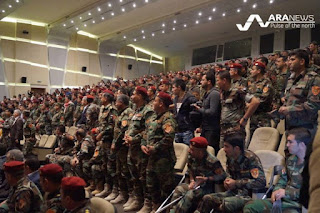 April 5, 2017
April 5, 2017By Jeffery Marcus
The Russian government (click here) has sharply contested accounts by witnesses and international leaders of a chemical attack that killed more than 100 people in northern Syria on Tuesday. Here’s what the available evidence tells us about the reliability of Russia’s account....
...There is no evidence that online video and photographs were fabricated. The images showed that scores of people, including children, died on Tuesday in Khan Sheikhun, in northern Syria, suffering symptoms consistent with having breathed in some sort of nerve agent, like sarin. Rescue workers and survivors described these symptoms as well....
According to AlJazeera there is confirmed use of chemical weapons. Second guessing authority can't go on forever. Sooner or later someone needs to recognize the scientists involved with these chemicals and their control even at storage facilities. If an investigation finds a crime has been committed, then it has been committed.
Any undermining of the United Nations for the purpose of Wall Street profits carry out permission for atrocities because perpetrators never are stopped.
April 6, 2017
Autopsy results (click here) have revealed that chemical weapons were used in an attack which killed more than 80 people in Syria's Idlib province, according to Turkey's justice minister.
Thirty-two victims of Tuesday's attack were brought to Turkey where three subsequently died.
 "Autopsies were carried out on three of the bodies after they were brought from Idlib. The results of the autopsy confirms that chemical weapons were used," Justice Minister Bekir Bozdag said, quoted by state-run Anadolu news agency.
"Autopsies were carried out on three of the bodies after they were brought from Idlib. The results of the autopsy confirms that chemical weapons were used," Justice Minister Bekir Bozdag said, quoted by state-run Anadolu news agency.
"This scientific investigation also confirms that Assad used chemical weapons," Bozdag added, without giving further details....
The Kurds have made incredible progress into Syria. Daesh has been relegated to lines in the sand.
The USA is debating entering Syria, BUT, please don't kill the Kurds. It happens all the time. As soon as NATO moves into Syria, Turkey ends up killing Kurds.
Peshmerga of Rojava during a conference in Iraqi Kurdistan.
February 25, 2017
Kurdish officials (click here) rejected statements of Anas al-Abdah, the President of the National Coalition for Syrian Revolution and Opposition Forces, who suggested that the Rojava Peshmerga forces are part of the Free Syrian Army (FSA).
“At the beginning of formation of the Rojava Peshmerga, the main goal was to train them to return to Syrian Kurdistan and to defend the region, but because of problems with the PYD they failed to reach a deal,” Zara Salih, a senior Yekiti politician told ARA News.
However, Salih said there was also no deal with the Syrian coalition. “The Peshmergas are not part of the FSA and they will never go to other areas [than Kurdistan]. The only possible solution is that the US guarantees both the Rojava Peshmerga and YPG [People’s Protection Units] to protect Syria’s Kurdish region and fight ISIS and other terrorist groups,” Salih said....
In my reading I have never found the Pestmerga forces to be part of any Free Syrian Army. The Kurds are autonomous. Turkey needs to end it's hatred and desire for ethnic cleansing of the Kurds. Kurds are not the enemy.
“The Rojava Peshmergas are not part of Turkey’s or the Syrian coalition’s agendas,” he said.
There needs to be a clear understanding that killing Kurds in addressing any issues with Daesh is as much a war crime as other atrocities in Syria.
...The Kurdistan Region has international airports in Erbil and Slemani, with direct flights to and from Europe and the Middle East. A new international airport is under construction in Duhok.
The majority of people in the Kurdistan Region are Sunni Muslims, mainly of the Shafi’i School. Some Muslims in the Region follow Sufi orders.
There are also a large number of Christians of different churches, such as Syrian Catholic, Syrian Orthodox, and Assyrian Church of the East, Armenian, and Catholic Chaldean.
A religion that is practiced only in Kurdistan is Yezidism, which has tens of thousands of adherents. The Kaka'i faith is also practiced in the Kurdistan Region.
The Kurdistan Regional Government protects people’s freedom to practice their religion and promotes inter-faith tolerance.
Thousands of Christian families have fled violence and threats in other parts of Iraq and found refuge in the Kurdistan Region.
For further reading about religion in Kurdistan, see the book Kurdistan Land of God, bilingual in English and German, by Francois-Xavier Lovat.

